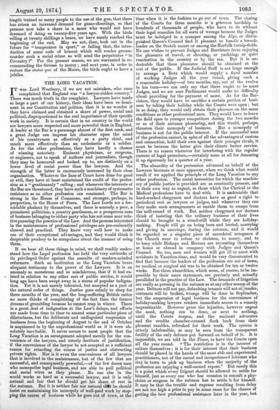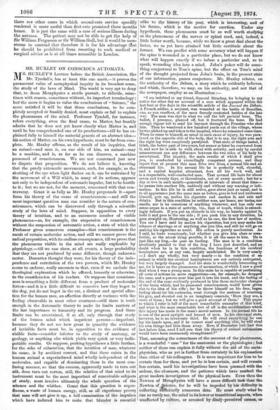THE LONG VACATION.
IT was Lord Westbury, if we are not mistaken, who once complained that England was "a lawyer-ridden country." There was much truth in the complaint. Lawyers have made so large a part of our history, their ideas have been so domi- nant in our Constitution and politics, that it is no wonder if they have claimed and obtained a share of power, social and political, disproportioned to the real importance of their specific work in society. It is certain that in no country in the world are lawyers more respected and more powerful than in England. A leader at the Bar is a personage almost of the first rank, and a great Judge can impress his character upon the mind of his countrymen as effectively as a party chief, and much more effectively than an ecclesiastic or a soldier. As for the 'other professions, they have hardly a chance of winning notoriety. Eminent physicians, or surgeons, or engineers not to speak of authors and journalists, though they may be honourea and looked up to, are distinctly on a lower level of social power than the lawyers. And the strength of the latter is enormously increased by their close organisation. Whatever the Inns of Court have done for good or evil, they have at least maintained the credit of the profes- sion as a " gentlemanly " calling ; and whenever the interests of the Bar are threatened, they have such a machinery of systematic resistance as no other profession can command. The Bar is strong in the House of Commons, and stronger, perhaps, in proportion, in the House of Peers. The Law Lords are a for- midable phalanx by themselves, and there is scarcely a peer, a prominent politician, a country gentleman, or a prosperous man of business belonging to either party who has not some near rela- tive pursuing the practice of the Law. And the persons interested in the maintenance of professional privileges are pre-eminently shrewd and practical. They know very well how to make use of their exceptional advantages, and they would think it despicable prudery to be scrupulous about the manner of using them.
If we bear all these things in mind, we shall readily under- stand how the Legal profession has held the very outworks of its privileged Order against the assaults of modern-minded reformers. Such an institution as the Long Vacation bears eloquent testimony to the power of the Lawyers. It is an anomaly so monstrous and so mischievous, that if it had ex- isted in relation to any other sort of public service, it would long ago have been swept away in a storm of popular indigna- tion. Yet it is not merely tolerated, but accepted as a part of the natural order of things. Justice goes calmly' -to sleep for three months of the year, and the long-suffering British suitor no more thinks of complaining of the fast than the farmer dreams of grumbling because he cannot reap in winter. There is a great deal of indignation at the Law's delays, and efforts are made from time to time to amend some particular piece of dilatoriness, but the deliberate and undisguised suspension of business from the beginning of August to the end of October is acquiesced in by the unprofessional world as if it were ab- solutely inevitable. It never occurs to most people that the Long Vacation is an arrangement adopted merely for the con- venience of the lawyers and utterly destitute of justification, if the convenience of the lawyer be not accepted as a sufficient reason for retarding the course of justice and obstructing private rights. Nor is it even the convenience of all lawyers that is involved in the maintenance but of the few that are successful, and consequently powerful,.—of the few dozen men who monopolise legal business, and are able to pull political and social wires as they please. No one else in the world works so hard as a successful lawyer, and it is only natural and fair that he should get his share of rest in the autumn. But it is neither fair nor natural Wit he should insist on maintaining his monopoly of well-paid work by stop- ping the course of business while he goes out of town, at the time when it is the fashion to go out of town. The closing of the Courts for three months is 'a grievous hardship to hundreds of thousands of people, who have to do without their legal remedies for all sorts of wrongs because the Judges must be indulged in a scamper among the Alps, or distin- guished Queen's Counsel find it pleasant to handle a breech- loader on the Scotch moors or among the Norfolk turnip-fields. No one wishes to prevent Judges and Barristers from enjoying the pleasures of travel, or shooting, or yachting, or quiet rumination in the country or by the sea. But it is un- desirable that these pleasures should be obtained at the cost of the public. If the Judicial Staff is not large enough to arrange a Rota which would supply a fixed number of working Judges all the year round, giving each a a reasonable holiday—of two months, say, out of the twelve in his turn—we can only say that there ought to be more Judges, and we are sure Parliament would make no difficulty about providing for the payment of more. As for the Bar- risters, they would have to sacrifice a certain portion of busi- ness by taking their holiday while the Courts were open ; but in so doing, they would onlj obtain their pleasure on the same conditions as other professional men. They would have to leave the field open to younger competitors during the two months or so of their autumn pleasuring, and this would, perhaps, threaten their monopoly of business. But a monopoly of business is not for the public interest. If the successful men of the profession cannot, in spite of all the advantages of custom and connection, hold their own against their younger rivals, it must be because the latter give their clients better service. There is no reason whatever for interfering with the regular current of legal procedure,—certainly none at all for damming it up rigorously for a quarter of a year.
The absurdity of the pretension advanced on behalf of the Lawyers becomes at once apparent, when we think what would result if we applied the principle of the Long Vacation to any other profession. The social necessities for which the machin- ery of public justice is provided are as constantly present, and in their own way as urgent, as those which the Clerical or the' Medical professions have to deal with. It is undeniable that hard-worked clergymen and doctors have as good a right to' periodical rest as lawyers or judges, and whenever they can they make such arrangements as enable them to escape from the mill-round of work. But neither clergymen nor doctors think of insisting that the ordinary business of their lives should be brought to a stand-still while they are holiday nicking. People will go on being born and buried, marrying' and giving in marriage, during the autumn, and it would be regarded as a singular piece of sacerdotal arrogance if the Church were to refuse to christen, to marry, and to to bury while Bishops and Rectors are recreating themselves' at home or abroad in company with Judges and Queen's Counsel. So, too, men and !women will get ill or meet with accidents in Vacation-time, and would be very discontented to find that because the leaders of the profession are out of town,. no medical or surgical aid was to be obtained for ten or twelve weeks. But these absurdities, which seem, of course, to be im- possible by their mere statement, are precisely and actually paralleled in the practice of the Law. The demands of litigation are really as pressing in the autumn as at any other season of the year. Debtors will not pay, defaulting tenants will not si\ render, contracts will be broken, wrongs will be done in September, but the suspension of legal business for the convenience of holiday-making lawyers renders immediate access to a remedy impracticable. However gross the injustice, however urgent the need, nothing can be done, or next to nothing, until the Courts reopen, and the eminent advocates and the erudite chamber-counsel flock back from their pleasant rambles, refreshed for their work. The system is utterly indefensible, as may be seen from the transparent futility of the only defence put forward on behalf of it. It is impossible, we are told in the Times, to have the Courts open all the year round. "The restriction is in the interest of suitors themselves ; it is for their interest that their business should be placed in the hands of the most able and experienced practitioners, not of the casual and inexperienced loiterers who stay in town to pick up business when the majority of the profession are enjoying a well-earned repose." But surely this is a point which every litigant should be allowed to settle for himself, just as every one who has occasion to consult a phy- sician or surgeon in the autumn has to settle it for himself. It may be that the trouble and expense resulting from delay are not too high a price to pay in some cases for the chance of getting the best professional assistance later in the year, but there me other cases in which second-rate service speedily rendered is more useful than first-rate promised three months hence. It is just the same with a case of serious illness during the autumn. The patient may not be able to get the help of Sir William Fergusson or Sir William Gull, but it would be mon- strous to contend that therefore it is for his advantage that he should be prohibited from resorting to such medical or surgical advice as is at all times accessible in-London.































 Previous page
Previous page